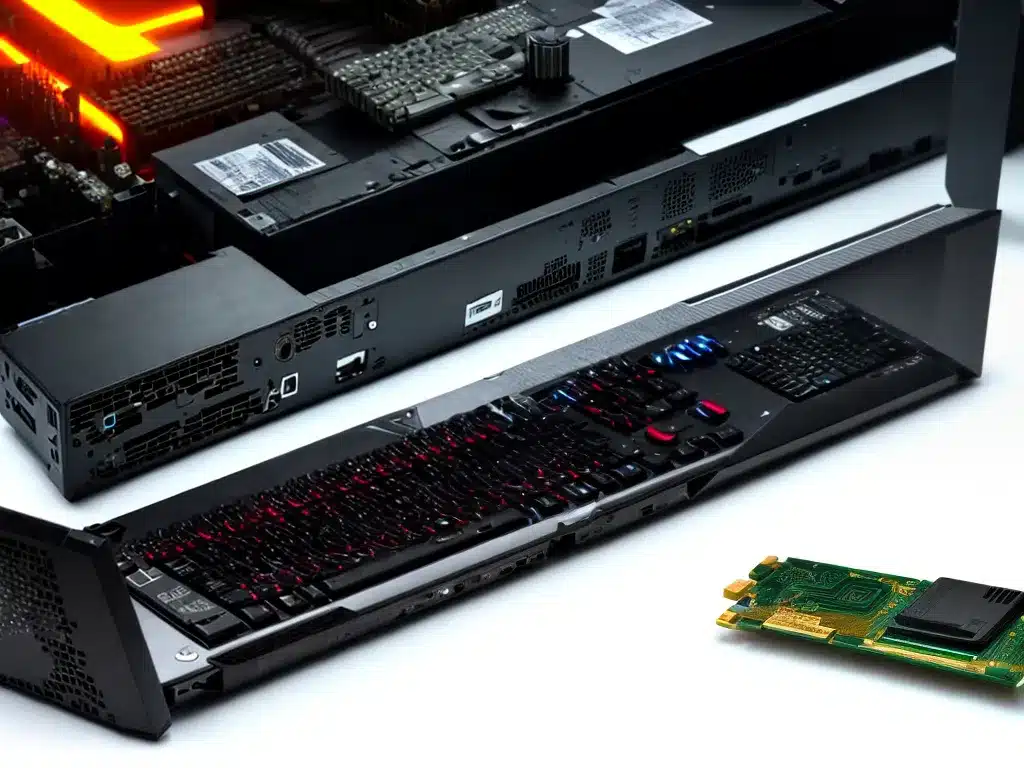
Introduction
Upgrading or replacing an aging computer is a common dilemma many face. As a PC gets older, it naturally slows down and struggles to keep up with newer software and tasks. So when performance lags, you have two main options – try to squeeze more life out of it by upgrading components, or start fresh with a brand new system. There are pros and cons to each approach, so let’s explore the key factors to consider when deciding whether to upgrade or replace an old PC.
Compare Costs of Upgrading vs Replacing
The most obvious consideration is cost. Upgrading select components like RAM, the hard drive, or graphics card is often cheaper than buying a whole new desktop or laptop.
For example, here’s a comparison of upgrade costs versus a new budget PC:
| Upgrade | Estimated Cost |
|-|-|
| Replace hard drive with SSD | $100 |
| Upgrade RAM from 4GB to 8GB | $60 |
| Upgrade GPU | $150 |
| Total Upgrade Cost | $310 |
A new budget desktop or laptop that could match these upgrades would likely start around $500 or more. So upgrading can be appealing to save money.
However, there’s a risk of spending on upgrades when you could put that money towards a new system with more long-term value. Shop carefully and run the numbers to see if upgrading or replacing makes more financial sense.
Factor In Age of Key Components
The age and capabilities of key components like the CPU and motherboard also determine whether upgrading could be beneficial or if a replacement is the wiser move.
For instance, if your PC is from 2010 or earlier, even with upgrades its processor and chipset will be quite outdated. So performance gains from upgrades may be minimal for the money spent.
Instead, putting that upgrade money towards a new PC with modern components often makes more sense for aging systems. The CPU, RAM, storage, and graphics will all be far superior to anything that old PC could support.
So weigh the age and potential of your current PC before sinking money into upgrades. They provide less value for older systems.
Consider Your Performance Needs
When deciding on upgrading versus replacing, think about your performance needs today and in the near future.
- Are you okay with basic web browsing, Office apps, and light photo editing? Upgrades may suffice.
- Do you need to run newer games, creative software, or intensive applications? A full replacement may be better.
Create a list of your must-have software needs and desired performance capabilities. This makes it clearer whether upgrading or replacing will allow your PC to meet those needs.
Prioritize upgrades that offer the biggest performance boosts for your particular needs, like a SSD, more RAM, or a better graphics card. If your PC still falls short, then it’s a sign to replace instead of pouring more money into an aging platform.
Factor in Repair/Troubleshooting Costs
An aging computer likely experiences more maintenance issues – hardware failures, buggy software, viruses, and more. So factor in the headache and costs of troubleshooting/repairs if keeping it running.
At a certain point, an old PC may require repair bills exceeding the value of the system. Then replacement becomes the obvious choice. But monitor repair costs throughout your ownership to determine total cost of ownership.
Consider how much time and frustration you’re willing to spend to keep an old system running. For many, starting fresh with a new PC leads to fewer headaches.
Weigh the Benefits of a Newer/Modern PC
Beyond raw performance, consider the experience and conveniences of a new modern PC. For example:
- Faster boot times and overall snappier performance
- Ability to run newer software/apps
- Newer ports and connectivity options like USB-C
- Better security features and hardware encryption
- Energy efficiency and longer battery life for laptops
- Smaller/lighter form factors available
- Support for multiple monitors/4K displays
Think about your needs and what new capabilities might benefit your workflow or enjoyment. This can help determine when the perks of an all-new PC outweigh upgrading an old one.
Get Input from Repair Experts
For those unsure whether upgrades can extend an aging PC’s life, seek professional input. Repair technicians can diagnose its capabilities and limitations.
Ask:
– How outdated are the CPU, RAM, motherboard, and other vitals?
– What upgrades will give me the best performance boosts?
– How much longer can this PC viably run if I upgrade X, Y, and Z?
– Do you foresee more costly repairs needed outside of upgrades?
Their expertise can provide perspective on whether upgrading or replacing makes the most technical and economic sense for your situation.
Consider Selling or Repurposing Old PC
If you decide to replace your aging desktop or laptop, look into options for selling it or repurposing. Older but upgraded PCs can still serve basic functions like:
- Kids computer
- TV media center
- Network-attached storage
- Smart home hub
- Retro gaming
You can sell the PC or pass it down. Getting extended use from an old system, even in a limited capacity, helps maximize your investment.
In Summary
When an aging PC slows down, carefully weigh the benefits of upgrading components versus buying a new system outright. Factors like performance needs, repair costs, capabilities of old hardware, and your budget all come into play. Use the considerations above to make the best choice for your needs and finances. Seek professional advice if still undecided. With the right information, you can determine whether upgrading or replacing is the wisest path forward.












